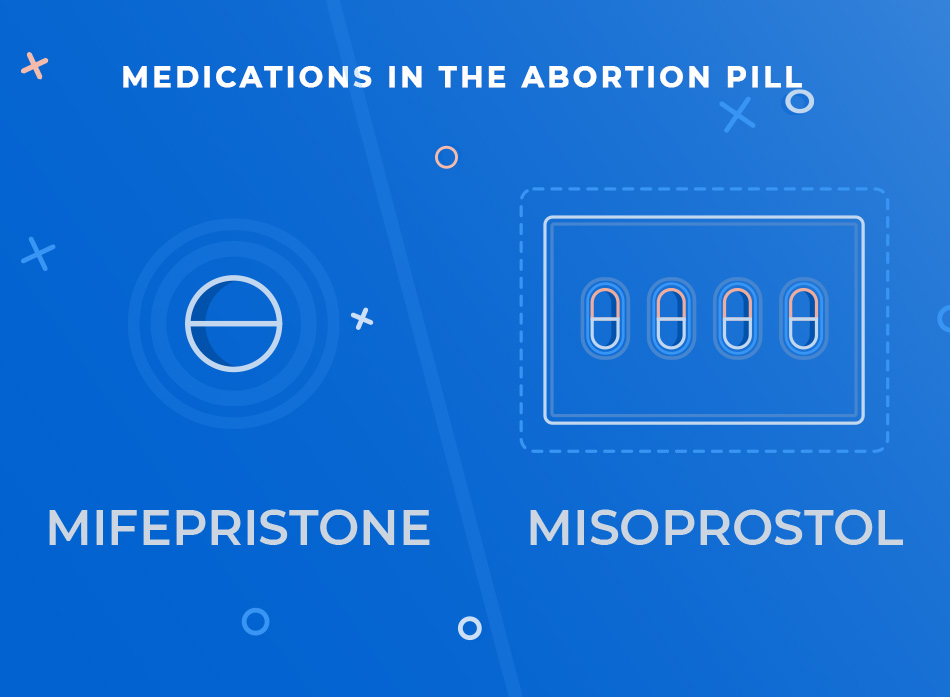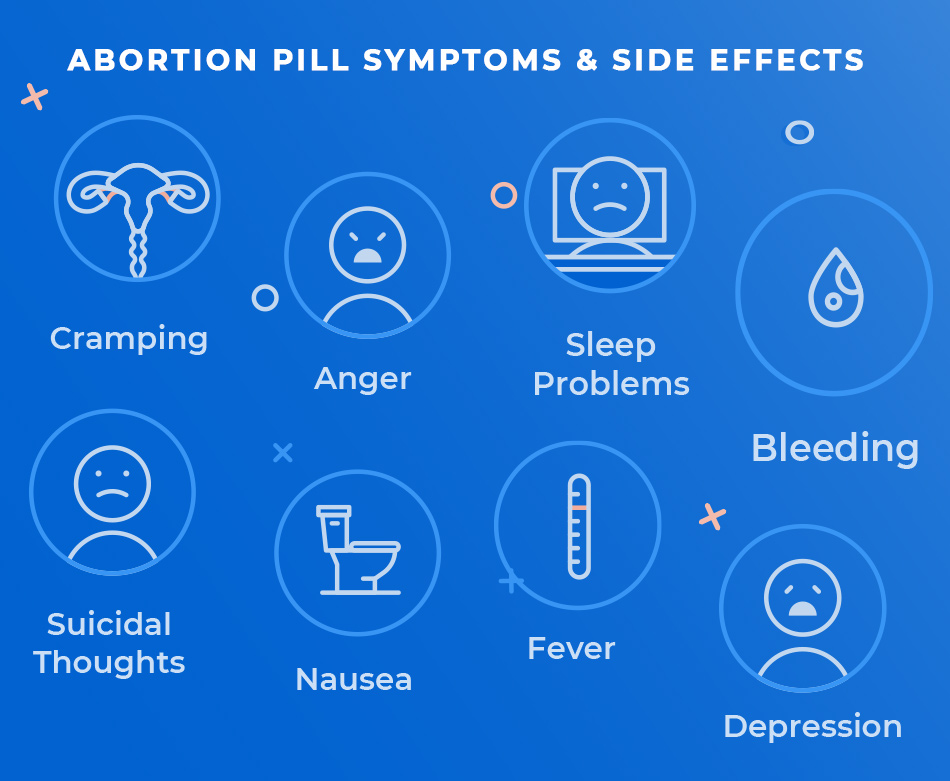
A Woman’s Choice does not perform or refer for abortion procedures. For specific information about our services, refer to the site above.
For women’s safety, the abortion pill is currently approved for use only through 10 weeks of pregnancy (70 days after the first day of your last menstrual period)1, and with the prescription and oversight of a licensed doctor. Before abortion medication can be prescribed, a patient will visit a doctor to receive screening and medical testing to determine if she is eligible to take the pill, including:
Although it’s called the abortion pill, medical abortion is actually a combination of two different medications. The first step in the process is to take a single pill called mifepristone (brand name, Mifeprex). This medication blocks progesterone to stop a pregnancy from growing.

The second medication is called misoprostol. This medication consists of four tablets that are taken at home up to 48 hours after the first pill. It will soften the cervix and cause intense cramping and heavy bleeding to expel the pregnancy. After taking both medications, the pregnancy is typically ended and passed from the uterus within 2 to 48 hours.3

Diarrhea, stomach cramps, or nausea may continue for a few days. Bleeding or spotting often continues for up to four weeks, followed by a normal period around week five or six. Some women also experience cramping for up to six weeks after taking the abortion pill.4,5
Some doctors have prescribed a 3x or 4x dose of misoprostol in place of taking both medications. However, studies currently show that misoprostol-only abortions have only a 78% success rate, with 22% of women requiring surgical follow-up.6, 7
The length of time it takes for the abortion pill to work can vary, with most abortions being complete after about 48 hours. Following the abortion, patients must return to their doctor two weeks later for a test or ultrasound to confirm that the abortion was completed and check for signs of infection or other complications5 — this step is very important! If a woman is unable to obtain a follow-up assessment, she may be ineligible for the abortion pill.
Including this follow-up period, the entire abortion process usually takes about two weeks from start to finish. If the abortion pill didn’t work properly, additional doctor visits will be needed for a second round of abortion pills or a surgical abortion—additional costs to the first abortion.
The level of pain and side effects experienced from the abortion pill varies from woman to woman, but there are expected symptoms that nearly everyone will experience, including heavy cramping and bleeding. Other common side effects include nausea, vomiting, fever, chills, and headache, emotional side effects, and more. Learn more in our guide on Abortion Pill Side Effects.
The total cost of the abortion pill depends on factors that vary in each woman’s situation. In Florida, the average cost for a medical abortion is $560, depending on your insurance coverage, complications, and other factors. Learn more in our guide to the Abortion Pill Cost.
Medical professionals determine how far along your pregnancy is by calculating the length of time since the first day of your last period and confirming it with an ultrasound. Ultrasounds also confirm the presence of a fetal heartbeat in the uterus to rule out a miscarriage or ectopic pregnancy. Learn more about how ultrasound results affect abortion eligibility.
The abortion pill must be prescribed by a doctor and is not available over the counter. The majority of abortion pills sold online are not legal and might be ineffective, counterfeit, tainted, and unsafe. Learn more about how to keep yourself safe in our guide to the Abortion Pill Online.
The abortion pill can be provided to women who are pregnant up to 10 weeks and is legal in Florida with a doctor’s prescription, providing she receives an ultrasound and abortion counseling 24-hours before an abortion. Learn more about abortion’s legal limits and exceptions in Florida.
A Woman’s Choice does not prescribe the abortion pill or refer for abortions. We are a non-profit community organization that is here to offer free education, medical testing, and support to women facing unplanned pregnancies. Learn more about our services here.
The abortion pill is about 98% effective at ending a pregnancy, depending on how early it’s taken. The later in the pregnancy the abortion occurs, the more likely there is to be a complication or failed abortion.9
The heaviest bleeding will be in the first 48 hours after taking the abortion pill. Bleeding or spotting often continues for up to four weeks, followed by a normal period around week five or six.5
The length of time it takes for the abortion pill to work can vary, with most abortions being complete after about 48 hours. If you do not experience bleeding within 24 hours after taking the abortion pill, this may be a sign the abortion pill is not working and you should consult your doctor immediately.
Due to the risk of infection, women should not put anything into the vagina for at least two weeks following an abortion, including tampons or menstrual cups.10
On average, most women ovulate within three weeks of an abortion, however, fertility may return as soon as a week.11
Plan B (also known as the morning after pill) is not the same as the abortion pill. Plan B is an over-the-counter form of emergency contraception that is designed to prevent pregnancy and will not end a pregnancy that has already been conceived. For more information on Plan B, click here.
The abortion pill and “the abortion pill” are common names for a series of medications used to terminate pregnancy including mifepristone and misoprostol.
Mifepristone is also known by its brand name Mifeprex or RU486, and misoprostol is also known by its brand name, Cytotec.
(2) https://medlineplus.gov/druginfo/meds/a600042.html
(4) https://www.cabbagetownwomensclinic.com/post/is-my-bleeding-normal
(6) https://www.ncbi.nlm.nih.gov/pmc/articles/PMC6309472/,
(7) https://www.sciencedirect.com/science/article/abs/pii/S0020729212002159
(8) https://www.accessdata.fda.gov/drugsatfda_docs/label/2004/020687s010-lbl.pdf
Our medical staff are licensed and will provide helpful, accurate information about your pregnancy.
Our team values your privacy. Your health information is 100% confidential and will never be shared with anyone.
A Woman’s Choice is here for you around the clock. Whether by phone, live chat, our 24-hour hotline, or sitting down face-to-face with you in our center, one of our team members is available to help you today.

